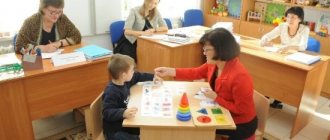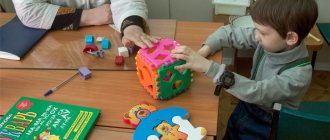Everything that a defectologist does is aimed at training, education and social adaptation of children who have physical or mental developmental disabilities. Correctional specialists are often called doctors, but this is incorrect. Despite the fact that defectology is at the intersection of medicine and pedagogy, a defectologist is not a physician.
Who is a defectologist
A defectologist is a correctional teacher who works with children with developmental disabilities. Despite the fact that the science of defectology developed at the intersection of medicine and pedagogy, this specialist is not a doctor. He is a special education teacher, and his main task is teaching and raising children with disabilities (disabilities).
Workers of this profile can be found not only in kindergartens and schools. They can be found in rehabilitation and social centers and clinics. He can work both with a specific child and with a group.
Defectology includes several branches:
- Oligophrenopedagogy - work with intellectual disabilities (mental retardation, mental retardation);
- Deaf pedagogy - work with hearing problems;
- Typhlopedagogy - work with visual impairments;
- Speech therapy - work with speech disorders.
The work of a defectologist in a kindergarten is very diverse and depends on specific disorders. You will rarely find this specialist in a regular school - he works in specialized schools for children with developmental disabilities. The school usually only has a speech therapist who deals with children with speech disorders.
Another important aspect of the work of a defectologist is the instillation of social and everyday skills. A child with intellectual disability does not adapt well to life, and blind people cannot navigate in space. A correctional teacher is called upon to help cope with this.
Parents' fears
Sometimes parents do not contact a speech pathologist. They are afraid of being diagnosed with any specific mental or physical abnormalities. But the defectologist does not make a diagnosis, but only describes the child’s condition and evaluates certain skills. The diagnosis is made by a doctor.
It happens that behavioral disorders and academic failure are not at all a manifestation of deviations in physical or intellectual development. To overcome difficulties in learning and behavior, it is enough for parents and teachers to follow the recommendations of a defectologist teacher on issues of education and creating a favorable environment in the family and children's team.
For example, one day a teacher asked: “The child writes poorly. Maybe he has dysgraphia? Dysgraphia is a very serious defect. In this case, diagnostics showed normal development and no writing impairments. The child simply had poorly developed fine motor skills. Regular, simple exercises to develop fine motor skills soon allowed the student to meet school writing skill requirements.
Parents should feel free to contact a defectologist. There can be no harm from consultation. A consultation is just a conversation. And untimely examination, diagnosis and treatment of a child will not allow him to receive correctional and developmental assistance. This violates the student’s right to receive a quality education and a prosperous life.
One third grade student could not read. He was diagnosed with mental retardation. Only when the mother provided the conclusion of the psychological, medical and pedagogical commission, the school was able to conduct correctional and developmental classes. The child learned to read. Without a timely examination and the help of a speech pathologist, such a child will not develop, and the time to smooth out developmental disorders will be irretrievably lost.
What kind of work does he do with children?
Teaches, educates, introduces them to the world around them, and more - this is what a defectologist does with children. This is not the most complete list of activities. They depend on the type of violation. The overall goal is to develop motivation for learning.
At the first stage, the teacher-defectologist conducts an examination. It affects all aspects of development. It is checked how children make contact, how they react, and what their pace of work is. Thinking, understanding of instructions, visual and auditory perception are examined.
Based on the results obtained, the teacher divides the children into groups. Pupils in them have approximately the same level of development. It is not possible to conduct group lessons with some children: autistic people fall into this category; these children are more often assigned to individual lessons due to the specific nature of this developmental disorder.
Classes are conducted in several directions:
- At the first stage, familiarization with the surrounding world is carried out. Ideas about it and its laws are formed. They develop attentiveness and responsibility for their actions.
- The second stage is the development of elementary mathematical concepts. During classes, the defectologist talks about the size, shape of objects and other characteristics.
Much attention is paid to sensorimotor development. Separate work is being carried out on the development of sensations. For this purpose, finger pools are made with various cereals and small toys. It is useful to prepare aromatic food, study vegetables, fruits, berries, touch them, examine them with your fingers. All this helps children develop different sensations.
Children with mental retardation have problems with games. It is difficult for them to contact someone and follow the rules. Therefore, they need the help of a speech pathologist. He competently guides the actions of his students and helps them find a common language with each other.
Consultations for parents are also indispensable. A defectologist can answer all their questions, give advice and help cope with the child’s problems.
Famous representatives of the profession
Vlasova Tatyana Aleksandrovna
Soviet psychologist and defectologist
Doctor of Psychological Sciences (1972), Professor (1976), Academician of the Academy of Pedagogical Sciences of the USSR (1982)
More details
Azbukin Dmitry Ivanovich
Russian Soviet defectologist, psychoneurologist
Doctor of Pedagogical Sciences, Professor. Honored Scientist of the RSFSR. He wrote a number of works on psychiatry, which deal with many problems of the pathology of the human psyche.
More details
Examples of working methods
The educational process is based on the characteristics of the disorder. For example, with hearing problems, oral speech decays. This is especially true for preschool age, since during this period there is an active formation of speech.
Hearing loss and lack of normal communication lead to the baby becoming silent. In the absence of proper correctional support, he loses the skill forever. Later he is taught sign language, but this greatly limits his ability to integrate into society.
Adaptation to real life is what a defectologist does in kindergarten and school. The teacher of the deaf focuses on the development of oral speech. The typhlopedagogue has to teach in a slightly different way. Its main task is the development of social and everyday skills. It is important to teach ideas about the world around us, to teach students to perceive the world “through their fingers.”
For this purpose, special voluminous books are created. They are made of different materials and depict: buildings, streets, animals, plants. All this allows students with visual impairments to form ideas about the world around them.
It is important to instill self-care skills, since sometimes parents do not allow their child to do this, depriving him of the chance for an independent life. Closer to school, preparation for mastering Braille begins. This is a raised dot pattern, which is analogous to regular writing. The blind perceive it through their fingers and read what is written.
Oligophrenopedagogues work with children with intellectual disabilities. This is mental retardation and mental retardation. Working with such students is based on the development of thinking. They are also taught self-service and communication skills. Children with mild mental retardation are taught to work.
General provisions
1.1. A teacher-defectologist is a pedagogical worker and is directly subordinate to [name of the position of the immediate supervisor].
1.2. A person with a higher professional education in the field of defectology is accepted for the position of a teacher-defectologist, without presenting requirements for work experience.
1.3. For the position of teacher-defectologist in accordance with the requirements of Art. 331 of the Labor Code of the Russian Federation, a person is appointed:
- not deprived of the right to engage in teaching activities in accordance with a court verdict that has entered into legal force;
- does not have or has not had a criminal record, has not been or has not been subject to criminal prosecution (with the exception of persons against whom criminal prosecution has been terminated on rehabilitative grounds) for crimes against life and health, freedom, honor and dignity of the individual (with the exception of illegal placement in a psychiatric hospital, slander and insults), sexual integrity and sexual freedom of the individual, against family and minors, public health and public morality, the foundations of the constitutional order and state security, as well as against public safety;
- does not have an unexpunged or outstanding conviction for intentional grave and especially grave crimes;
- not recognized as legally incompetent in the manner prescribed by federal law;
- does not have diseases included in the list approved by the federal executive body exercising the functions of developing state policy and legal regulation in the field of healthcare.
1.4. A teacher-defectologist is appointed to the position and dismissed from it by order of [name of the manager’s position].
1.5. A teacher-defectologist should know:
— priority directions for the development of the educational system of the Russian Federation;
— laws and other regulatory legal acts regulating educational, physical education and sports activities;
— Convention on the Rights of the Child;
— developmental and special pedagogy and psychology;
— anatomical, physiological and clinical foundations of defectology;
— methods and techniques for preventing and correcting deviations in the development of students and pupils;
— normative and methodological documents on issues of professional and practical activity;
— program and methodological literature on working with students and pupils with developmental disabilities;
— the latest achievements of defectological and pedagogical sciences;
— labor protection and fire safety rules;
— theory and methods of managing educational systems;
— modern pedagogical technologies for productive, differentiated, developmental education, implementation of a competency-based approach;
- methods of persuasion, argumentation of one’s position, establishing contacts with students, pupils of different ages, their parents (persons replacing them), work colleagues;
— technologies for diagnosing the causes of conflict situations, their prevention and resolution;
— fundamentals of ecology, economics, sociology;
— labor legislation;
— basics of working with text editors, spreadsheets, email and browsers, multimedia equipment;
— internal labor regulations of the educational organization;
— labor protection and fire safety rules.
1.6. A teacher-defectologist is prohibited from:
— provide paid educational services to students in this organization, if this leads to a conflict of interests of the teacher-defectologist;
- use educational activities for political agitation, forcing students to accept political, religious or other beliefs or renounce them, to incite social, racial, national or religious hatred, for agitation promoting the exclusivity, superiority or inferiority of citizens on the basis of social, racial, national, religious or linguistic affiliation, their attitude to religion, including by communicating to students false information about the historical, national, religious and cultural traditions of peoples, as well as to induce students to take actions contrary to the Constitution of the Russian Federation.
Problems of defectology
In modern conditions, not all persons with disabilities receive assistance. There are children with a complex structure of the defect, for example, deaf-blind. Until the last century, they were all considered unteachable, until the famous American teacher Anne Sullivan showed an example of teaching such a child. It is her photograph that is the title of this article.
Her student, Helen Keller, lost the ability to hear and see after a serious illness. The girl's fate was unenviable - an orphanage. But Sullivan has proven that it can be adapted to society. Keller became an activist, writer, and lecturer. Her activities were widely publicized in society. However, in the modern world, teaching such children is associated with a number of difficulties.
The increased number of children with autism spectrum disorder (ASD) requires speech pathologists to develop new training programs. In the last century they were considered mentally retarded, but modern research has refuted this. Work with such children should be aimed at developing communication skills.
To summarize, we can say that a defectologist carries out extremely complex, but very important work. Important for both the baby and his parents. This allows children to be socialized as much as possible in society.
Career
The career of a defectologist usually begins with an ordinary position in a specialized budget institution. Usually he is assigned a curator who controls the actions of the newcomer. At this stage, the employee’s salary is 15-20 thousand rubles. After 2-3 years of practice, the employee can begin to independently receive visitors. His earnings increase to 30-45 thousand rubles. Over time, a practitioner can move to a management position with an increase in income to 50-70 thousand rubles.
In private educational and educational institutions, defectologists receive an average of 50 thousand rubles. Such positions are usually filled by experienced representatives of the profession, holders of an academic degree. When running a private practice, professionals of this type earn from 60 thousand rubles per month.
[salary]
When should you go to a speech pathologist for the first time?
— You can show up for the first time at 1–1.5 years old. If there is any deviation from the norm of speech development, then this will be visible even at one and a half years old, recommends I. Kunevich. - If your baby’s speech development is normal - there is humming, babbling, the first words and phrases appear - do not worry and do not worry until the age of 3.5-4 years. If anything worries you, contact a speech pathologist earlier.
It happens that many children are simply afraid to go to the clinic. In this case, the child needs to be adjusted. For example, you can first play doctor and patient with him, advises a special education teacher.
- In no case should you demand that a child speak, while threatening that “otherwise your aunt will give you an injection,” or comment on how he follows the specialist’s instructions - the child will get scared and withdraw into himself. It is worth telling your child that in this office he will only play and look at pictures, and also praise him for every answer. In this case, the little patient will feel comfortable,” explains I. Kunevich.
Photo osteopatcenter.ru
The specialist shared:
— There are cases when children are initially afraid of a speech therapist, but most often, as soon as the door to the speech therapy room opens, the child sees a bright room with toys, books, various aids and calms down. If the child does not make contact, we begin to communicate with him in the game, and in the process a diagnosis is carried out.
Sometimes parents, knowing that the child will behave awkwardly at the first appointment, record audio or video of him playing and saying something. Then I can consult after hearing the patient’s speech from the recording, if he is completely withdrawn in the office,” the defectologist noted.
How long does it take to eliminate a speech impediment?
According to the specialist, on average it will take from three months to a year. I. Kunevich emphasized that everything depends on the complexity of the defect, the characteristics of the child, as well as his parents .
Defectologist I. Kunevich advises parents to love their children and accept them for who they are. At the same time, it is important to help them develop, become more self-confident, courageous and strong.
“Speak to a child as to an adult: clearly, understandably (you can express your love even through intonation) - this way he will develop the correct perception of speech,” noted I. Kunevich.
Prepared by Artem Troyanovsky
Is it true that more and more children do not want to start talking?
According to the specialist, such a problem exists and can be explained by various reasons.
“For example, mother and child are affected by unfavorable ecology even during the period of intrauterine development. This also includes the bad habits of parents,” noted I. Kunevich.
Another reason is heredity. If one of the parents or other relatives started speaking late or did not pronounce complex sounds, there is a high probability that their child will have the same problem. But remember that a child is a different person, and everything may be different for him.
— It is also worth noting that the presence of gadgets in children is a real scourge of the new generation. It’s easier for parents to calm and occupy their child for a while with a phone or tablet, says the specialist. — Many parents, being too busy at work, do not devote enough time to children who need it.
It is important to build a close and trusting relationship with your child, do not forget to talk to him more often, and read with him, says I. Kunevich. Instead of having fun with gadgets, it is better to offer a book.
How are classes conducted?
— First, I examine the child and identify speech disorders. Next, I determine a plan for corrective work with a specific patient,” explained I. Kunevich.
The teacher’s arsenal includes many interesting aids, innovative developments for the development of articulatory and fine motor skills, breathing and finger exercises, playbooks for stimulating speech development, aids for correcting writing and reading in primary school students.
“Secondly, I try to consult parents in detail and, if necessary, conduct a training session with them. In such classes, the mother sits next to the child and watches (sometimes documents) how I work with the baby. At the end of the lesson I tell you what I did and why. There were many cases when, examining a child’s articulatory apparatus, I could immediately make a sound, and everyone left happy. But only for inorganic disorders,” shared I. Kunevich.








